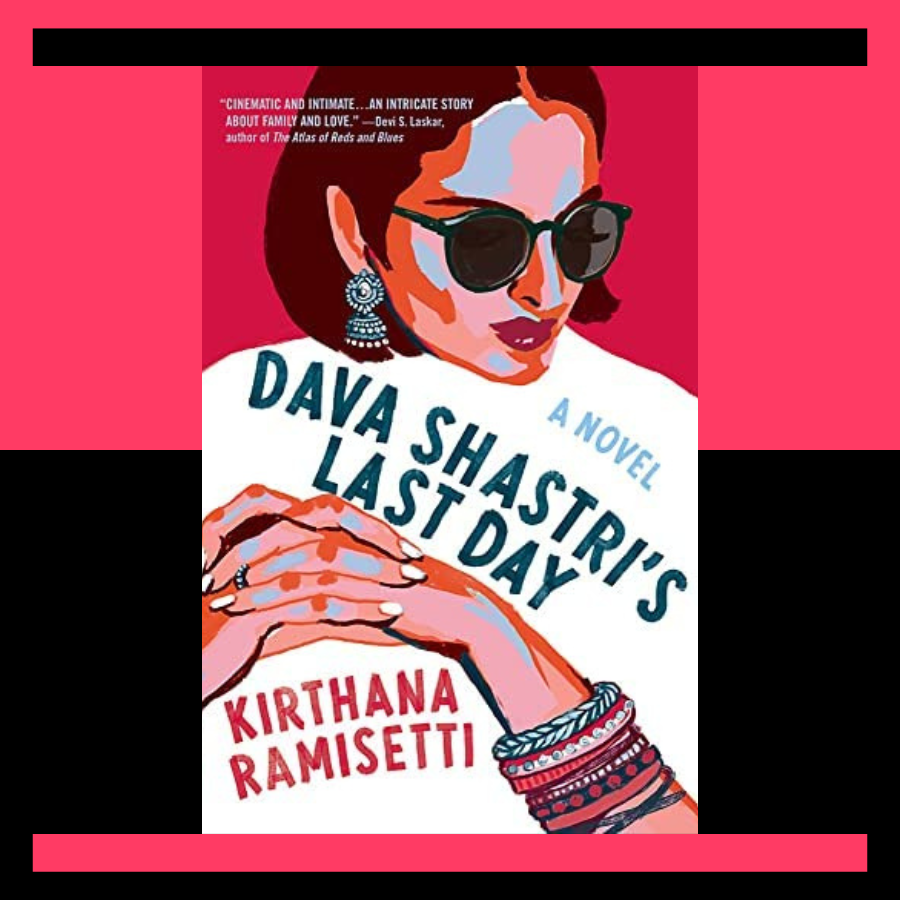Don’t let the title fool you; Dava Shastri’s Last Day is about so much more than Dava Shastri’s last day. Kirthana Ramisetti’s exciting and heartwarming debut novel is about the life of a self-made billionaire who has uncompromising ambition, serious concern about legacy, and deep — if sometimes misconstrued — love for her family.
The story centers on 70-year-old Dava in the year 2044. Dava has planned a holiday weekend with her children and grandchildren on her east coast private island (because, of course). It seems innocuous enough, but shortly after arriving on the island, Dava’s four grown children learn their mother is terminally ill. She’s opted out of treatment due to the advanced state of her cancer so, as she tells her two sons and two daughters, she’s “decided to look at my condition as a gift, in which I could say goodbye to the world — and all of you — on my own terms.”
Not only are the four siblings about to say goodbye to their mother forever, but Dava — ever meticulous about her reputation — has officially announced her death a day early so she can read her obituary and know what the world has to say about her and her legacy. Unfortunately for Dava, the “reviews” of her life show more of an interest in her personal secrets than in her generous philanthropy or her life as a powerful feminist role model. “No matter what a woman achieves, she is always reduced to her sex life,” she thinks.
While Dava is the anchor of the family and the story, the novel cycles through the perspectives of Dava and her family members. Arvie is Dava’s eldest, and he’s struggling with marital troubles as he and his husband parent their two daughters; Sita is the leader of the family who handles the demanding family business in addition to being a mother of two; free-spirited Kali is going through relationship troubles of her own on this holiday weekend; and Rev has arrived with his new fiancée Sandi — who happens to be pregnant with the newest Shastri heir. Ramisetti’s writing seamlessly dives in and out of the different family members’ experiences, showing both the futility of Dava’s plan to 100% control her legacy and the future of her family, and the enduring impact that Dava has had on her children and grandchildren.
The novel is a fun, light-hearted read that touches on many important topics without getting too deep into them. My favorite moments were the scenes from earlier in Dava’s life, when Ramisetti invites the reader into specific memories of Dava’s. Many of these scenes are adventurous and life-affirming, often speaking to the power of pop music, a topic that does not always get the serious respect it deserves (who among us has not had a pop song get them through a difficult time?). Because the press reveals Dava’s potential secrets in the aftermath of her faux death, the story has exciting twists and turns as the reader gets to discover what’s true, what’s false, and what’s in the more complicated place in between.
I would have liked to dig a little deeper into some of the interesting themes and representations in the novel, though diving deep into topics like assisted suicide (the premise of the story) would change the tone and make this a different read altogether. The characters hint at potential struggles they have around race (particularly around biracial identity), including when Rev’s white fiancée Sandi wonders what their baby might look like after studying Rev’s nieces and nephews. “They’re so many different things they don’t look like anything in particular,” Rev says to her. And in one powerful scene, Dava recounts how she used to be constantly mistaken for her children’s nanny because her skin was darker than theirs.
Ramisetti also respectfully and authentically depicts unconventional gender roles (especially in Arvie’s and his husband’s relationship and through Dava’s extraordinary career ambitions) and the still-underrepresented topic of polyamory (as Kali works through her relationship struggles with two partners while simultaneously needing her family to see these struggles as valid).
It was fun to wind up in present-day USA in the flashbacks to earlier in Dava’s life, and the 2044 setting made some things possible, such as a refreshing depiction of a gay couple that raises no eyebrows from anyone in their family. But I felt the story could have had a little more fun with its futuristic setting. Even if 2044 is not that far off, I expected to meet characters who lived in a different world than I do, which I never quite felt to be the case. (Of course, this may have been Ramisetti’s intention, as the novel grapples with intergenerational dynamics and parallel life moments.)
Ultimately, Dava Shastri’s Last Day is an entertaining read that got me thinking about legacy, ambition, work, and family and how all those things intertwine in necessary but complex ways, particularly for women of color. Dava Shastri is an unapologetically ambitious Indian-American woman who wants to do things for herself, in her own way, on her own terms. Readers will undoubtedly feel inspired by her, and maybe even feel compelled to take on some small piece of her legacy.
P.S. If you think this novel sounds like it has all the juicy sustainable conflict of a TV show, you’re not wrong. It’s currently being developed by HBO Max, so stay tuned!


